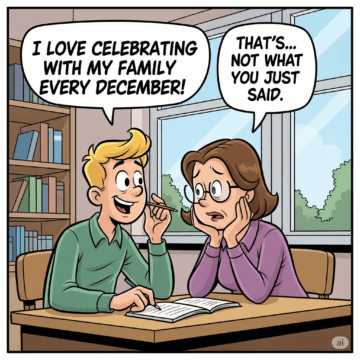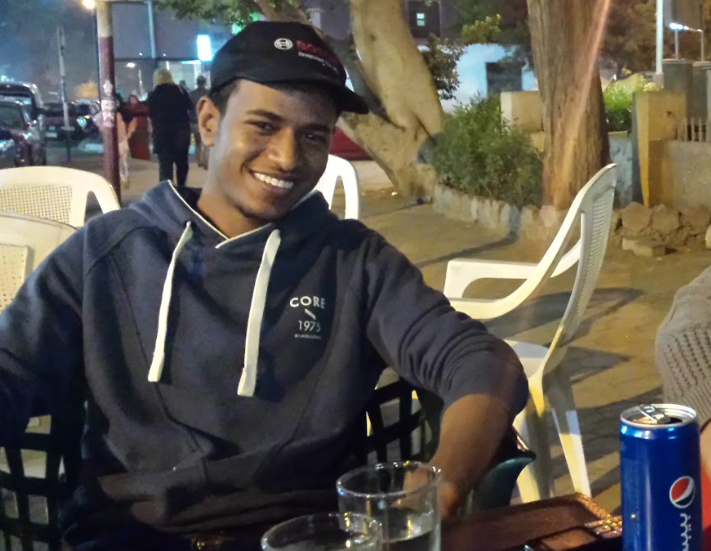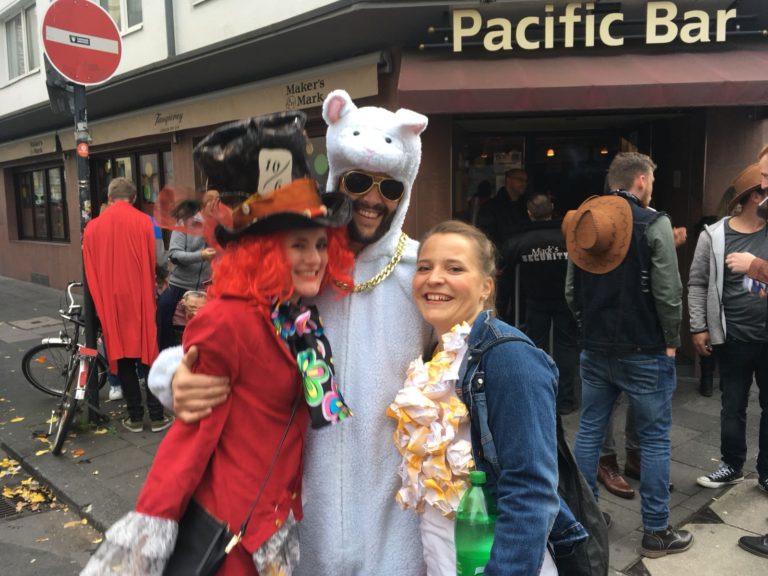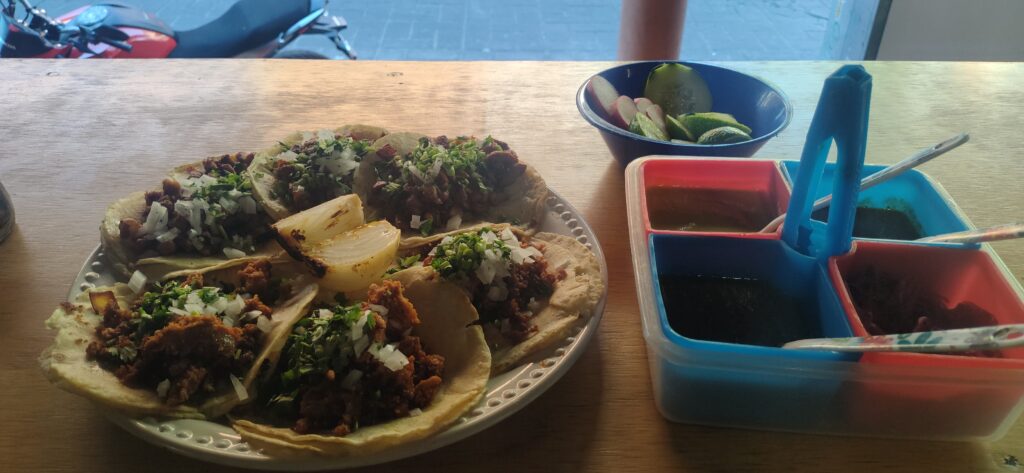by Eric Schenck
 At a Christmas market in Germany, I told my German girlfriend’s mother that I masturbate with my family every December.
At a Christmas market in Germany, I told my German girlfriend’s mother that I masturbate with my family every December.
Of course (I swear), this was a mistake. What I was trying to say is that my family and I do a gift exchange every year. What I actually said? That we do a fair bit of masturbating together.
As I learned that snowy evening, the words are practically the same in German:
- “Wechseln”: exchange
- “Wichsen”: masturbate
Just a few letters off, and an entirely different world of meaning.
My girlfriend Janina knew what I was trying to say. But Gitta? She looked at me like I was a monster, like her daughter had picked the biggest piece of shit in the world.
Do I masturbate with my family every Christmas? I do not. But the story does make me laugh. And if you’re serious about learning a language, you need to laugh, too.
Over the last 15+ years, I’ve learned four of them:
- Spanish
- Modern Standard Arabic
- Egyptian Arabic
- German
Here are some things about each one that have me laugh (or at least awkwardly smile)…
Spanish (2007-2011): Your New Best Friend That Shows You The Way
At my California high school, we are required to take at least two years of a foreign language. This is how my trip through languages starts.
I remember the first few vocabulary lists. I mumble phrases underneath my breath, which make me feel like some kind of wizard. Mrs. Jiminez’s class quickly becomes my Hogwarts.
Learning Spanish shows me what being a baby must be like. It’s uncomfortable. My mouth has never made these sounds before. By the end of the day, my cheeks and tongue are sore.
I end up doing four years. My best friend is Mexican, and I start to chat with his dad in Spanish. It’s the first time I experience this kind of magic.
Learning languages is easier than I thought. By the time I graduate, I’m solid in Spanish, and feeling like some kind of linguistic genius.
Arabic will change that.
Modern Standard Arabic (2011-2015): Your Father That Never Thinks You’re Good Enough
My vague plan after college is to become a diplomat in the Middle East. That’s how I start with Modern Standard Arabic (MSA).
From 2012 to 2015, I’m surrounded by a completely new system of language. The alphabet is different. The grammar messes with your head. The pronunciation is unlike anything I’ve ever heard. And writing from right to left? Not only is it strange, but I finally see what left-handed people were complaining about with “smeared ink.”
Spanish was difficult because it was new. MSA is difficult because it’s just really, really hard.
It’s my first experience in fully committing myself to something weird and seeing what can happen. MSA starts difficult, and continues that way. But hopelessness at its impossibility turns into some rudimentary understanding. The language slowly reveals itself.
By two years in I’m good enough to get a job as an Arabic Teaching Assistant. I work alongside Raj. He’s Jordanian, and I get a crash course in the different cultures of the Middle East.
A few months before graduating in May of 2015, I decide to teach English in Cairo. I know dialects are a bit different from MSA. The internet has told me that. Raj has told me that. But I assume some kind of intermediate competency in MSA will help.
Sure, this formal style of Arabic might be my dad that’s never quite impressed with my efforts. But at this point I’m pretty good. Plus, college brochures have told me that MSA is what I need to “communicate with the entire Arab world”. What could go wrong?
In August of that year I pack my bags, and board the plane to Cairo confident in my abilities.
Egyptian Arabic (2015-2018): Your Grandmother That Always Has A Cookie
Within 24 hours of moving to Egypt, I realize all those college brochures were full of shit. I speak MSA in the streets of Cairo, and people awkwardly glance at each other.
Who is this guy? And why does he sound so weird?
I have to start over again. Thankfully, Egyptian Arabic isn’t just completely different from MSA. It’s also easier. The pronunciation is smoother. Vocabulary seems less complicated. The grammar, if not breakable, certainly bends.
Egyptian Arabic is less of a problem than MSA. But stuff to actually learn it with? That’s an entirely different issue.
Look up resources to learn Arabic online, and pretty much everything will be something in Modern Standard Arabic. Dialects? The world seems to think they’re not actually languages. Reddit forums tell me to “stick to the real Arabic.”
It’s frustrating to read when “real Arabic” gets me nothing but laughs and answers I can’t hope to understand. Egyptian Arabic seems pretty real to me.
Contrast this with my experience in college. Back then, I was having chats with Raj, correcting homework, and listening to MSA news podcasts. My grasp on Modern Standard Arabic was pretty solid.
But it was all theoretical. Sitting next to Raj and feeling proud of myself, I had time to think. I could craft answers. I didn’t have to deal with screaming taxi drivers and men smoking cigarettes and street donkeys drowning out the sound.
It’s a valuable lesson in language acquisition: the real learning happens in the streets. And I suppose I like it that way.
Living in Cairo is also my first foray into language exchange partners. It’s a simple system: one hour of speaking in Egyptian Arabic (along with corrections), followed by the same in English.
It’s the closest thing you’ll find as an adult to playing in the sandbox in kindergarten. You and your exchange partner are both hot shit back home. But in this new environment? You bond over your inability to form basic ideas.
My favorite one is Mohamed.

He’s around my age, and once a week I take an hour-long metro ride to visit him. We sit at an outdoor cafe and talk about everything. These conversations are some of my favorite moments. Egyptian Arabic becomes less of a theoretical tool, and more of a way to chat with my friend.
I bond with Egyptians. I soak up their culture (as much as I can), and get insight into an entirely different way of thinking about the world. Mohamed lives with his family. He wants to get married as soon as possible. His goal is to have three kids by the time he’s 30. We couldn’t be more different, but these sandbox exchanges bring us together for a few hours at a time.
There is pride in this like nothing else I’ve ever done. I create a blog called Cleo Lingo all about learning Egyptian Arabic. And just as I start to get really good – it’s time to move on.
I meet Janina. She’s German and has an internship in Cairo. It seems like good timing: she’s great, I’m getting tired of traffic jams, and living in Europe seems like it’d be fun.
In July of 2018 I head to Düsseldorf. I’m loving the Arabic language, but it’s time for a new one.
German (2018-2023): Your Overly Precise Uncle That Might Have Autism
German, oh German.
There’s a reason I bring up the “autism” bit. For both the German language and the German people, everything has its place. Everything needs to go where it belongs. Everything should be done in a particular order. It’s a country built on precision.
Sometimes it’s charming. Sometimes, for those of us that are a bit more “messy” of a human (especially after Egypt), this whole precision thing feels a bit… particular?
I’m not convinced of the culture, but I jump straight into the language. Compared to Egyptian Arabic, I feel like I’ve found a cheat code. German is weird but much closer to English. The pronunciation is easier to train my mouth around. I sit down at my computer and watch hours of beginner German videos. The language quickly starts to take shape in my head.
My saving grace? Düsseldorf (and the area surrounding it) speaks something close to Hochdeutsch. “High German” is essentially the Modern Standard Arabic equivalent of the German language. The difference is, people actually speak it.
The weirdness comes with the dialects. They are a bit tamer than Arabic (I cannot understand a single word from Moroccans, for example), but still enough to mess with you. The further south I go in Germany, the more I struggle. I go to a wedding in Bavaria and politely not my head during conversations. I just pray that they don’t ask me a question.
And once you get to a new country?
All bets are off. Austrian German I can muddle my way through. They understand me, but I can only pick up about half of what they’re saying.
As for the famed Schweizerdeutsch of Switzerland? Not a chance.
German is my first experience with vague formalities. In German you have two versions of “you”: du (informal) and Sie (formal). You will conjugate a verb differently depending on which one you use. That’s easy enough. But when to use which?
Not so cut and dry, apparently:
- Your boss, normally a “Sie” stickler, gets drunk on Friday and tells you to start calling him “du”. What do you do on Monday?
- You’ve been dating somebody for a few months. You’re meeting their parents (who they insist are pretty casual), but you want to make a good impression. Which one do you go with?
- You match with your professor on Tinder. The confusion is enough to break your brain.
Months tick away. And then years.
I date two German women, meet their German families, and make German friends. I go to German parties, compliment German beer, and criticize German weather. I’m getting better. And quickly.

I also discover a hack for remembering German vocabulary: listen to the mistakes Germans make when speaking English.
If they want to go to the gym, they are going to “do sport” (sportmachen). When they want to bitch about their boss, they actually complain about their “chef” (Chef / Chefin). Multiple times, I’ve heard a German looking for their “hand shoes” (“gloves” are Handschuhe).
It’s an enjoyable way to keep German active in my brain even if I am speaking English.
Almost every single problem I had with Egyptian Arabic vanishes when I start learning German. Almost. One remains, and it’s unlike anything I’ve experienced: how useful it actually is with Germans themselves.
With Egyptian Arabic, I was never legitimately advanced. But that didn’t really matter. Most Egyptians don’t speak English particularly well. Make your way out of “expat groups” with highly-educated Egyptians, and your skills in the dialect become increasingly essential. The 60% of the language I know covers the vast majority of interactions and conversations.
With German? After a few years, I can comfortably chat about almost anything. I’ve learned 90% of the language. But it’s still nothing compared to the average German in the area I live. They listen to English music. They watch English TV shows. They even drop English slang into their conversations with German friends.
It’s a strange thing to experience as a native English speaker serious about using German. You get in a chat with a German. They notice your accent, but don’t think much of it with your general fluency. Finally the question comes: Woher kommst du? (“Where do you come from?”). As soon as you say you’re from the U.S., their eyes narrow.
You both know damn well the German has likely been speaking advanced English since they were a teenager. You could be having a more complicated (and more precise) conversation if you just switched to English. And Germans are all about precision.
But they humor you. They let you make mistakes. And so it goes.
Speaking German with Germans, my insecurities about my own intelligence rear their ugly head like never before. I’m fucked either way: I’m an idiot when we speak German and I express myself imprecisely, and I’m an idiot when I play the “typical American” card and we stick to English.
By the end of 2023, it’s time to go. I’m single again, I’ve sold my things, and I feel like I’ve worn out my welcome in Europe’s largest economy. I fly back to the U.S. for Christmas with two giant suitcases of clothes and books.
The last person I talk to at the Cologne airport turns out to be Egyptian. We chat a bit in German, then switch to Egyptian Arabic. Both our faces light up. It’s some kind of full circle moment.
Once again, learning languages shows itself to be the best thing I’ve ever done.
Spanish (2024-now): Your Old Best Friend That Listens To Your Stories
And back to Spanish I go.
In the last two years since leaving Germany, I’ve spent half of my time in Mexico. I’ve made the switch back to the language I started with.

We’ve both changed, in our own ways. Grown apart. Seen some things, but come back together at last. In a funny way, it feels like I’m letting Spanish in on a secret.
Look at all these languages I’ve been hanging out with. Let me tell you how weird they are. Did you know people don’t really respect Mrs. Egyptian Arabic? And Mr. German? My god – he’s a strange one!
It’s weird to compare myself now to the Eric who started with Spanish almost 20 years ago. Back then language acquisition was some form of black magic. It was an imprecise art. I didn’t know what I was doing, and people that spoke more than one language were in all likelihood geniuses.
But now I’ve peaked behind the curtain. Language learning is simple (if not easy): get started, do it a lot, and change your system as you go. Eventually you get good.
If I’ve understood one thing the past 15+ years, it’s that learning a language is an experience like no other. And it’s one that I wish on more of my fellow English native speakers.
Most of us only speak one. And while English is certainly useful, limiting yourself to just that cuts you off from so much.
The world is a big place. I can guarantee you that somewhere, in some tucked away corner, there is a culture that would turn you into a nerd. Something that would take your breath away. A niche interest that would get you obsessed, and make the world feel a little more exciting.
And the best way to connect with that thing?
By speaking the language, of course.
A Graveyard Of Languages
I suppose at a certain point, my mind will become a graveyard of languages.
In a way, it’s already happening. My grasp on Modern Standard Arabic is dead and gone. I can still chat in Egyptian Arabic, but it’s clearly rusty. My German remains strong, but I can feel it slipping away.
As for my Spanish?
It’s getting better, and at a certain point, I’m sure it will be just as strong as my German was.
But everything ends at some point. Your brain takes on new challenges. You become interested in completely new things. And that’s OK.
I still have other language projects in mind. I would love to speak French. It’s sexy, and the thought of cruising around southern France, sipping wine when I want, and chatting to locals sounds delightful.
Turkish would also be great. Istanbul is my favorite city in the world, and the absurd aggulutination of Turkish grammar (adding a bunch of suffixes to one word to convey complex ideas, instead of new words like most languages) sounds fun and ridiculous. It could be another challenge for my brain.
Plus, writing + languages is the best combo I can think of. It’s a life goal of mine to do a language project with somebody in my family, take a trip to that country, and then write a book about our linguistic adventures. I can’t think of anything cooler.
But what’s it worth? It’s a shame to spend so much time learning a language, only to forget it if you don’t use it.
Then again, maybe the graveyard analogy isn’t quite correct. That implies a certain finality. That the languages are dead and never coming back.
I’ve seen that the opposite is true. Get good enough, and languages don’t die. They just lie dormant in your brain, waiting to be welcomed back into your life. Nothing is really ever lost. The language stays up there. So maybe, just maybe…
It’s more of a pet cemetery of languages. Sure, some of my languages are technically dead… but they’re just waiting to come back, in some new and slightly grotesque form.
A stretch of an analogy?
A bit disturbing?
Most certainly. But it feels right, and crucially, it makes me laugh.
And like I said at the beginning…
When it comes to language learning, and you’re trying to charm your girlfriend’s mom with anything but stories of familial masturbation…
That’s really the most important thing.
Enjoying the content on 3QD? Help keep us going by donating now.
